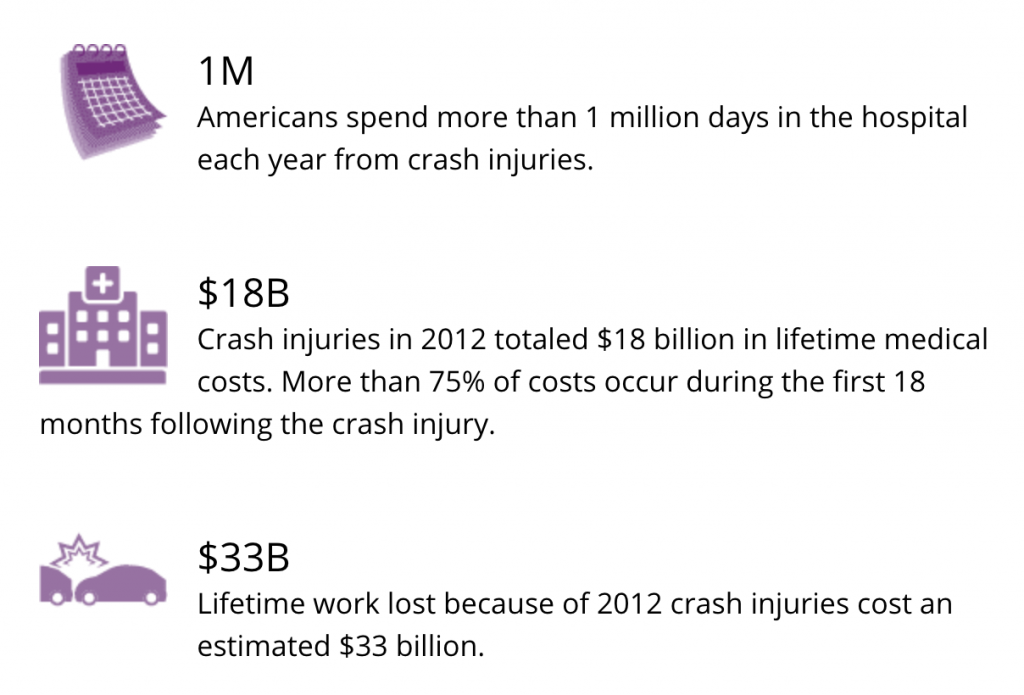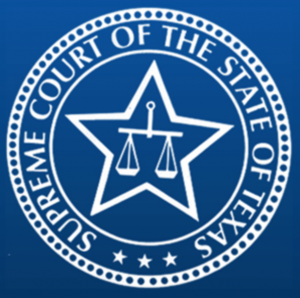 According to the Centers for Disease Control (CDC), motor vehicle accidents are the leading cause of injury in the country. Most Texas car accidents are preventable, and negligent drivers are responsible for these incidents’ harmful and expensive aftermath. The CDC explains that Americans spend over 1 million days in the hospital each year from accident injuries. Further, the most recent data suggests that crash injuries totaled nearly $18 billion in lifetime medical expenses. The majority of these costs occur during the first year and a half following an accident injury. Moreover, these injuries cost approximately $33 billion in lifetime work lost.
According to the Centers for Disease Control (CDC), motor vehicle accidents are the leading cause of injury in the country. Most Texas car accidents are preventable, and negligent drivers are responsible for these incidents’ harmful and expensive aftermath. The CDC explains that Americans spend over 1 million days in the hospital each year from accident injuries. Further, the most recent data suggests that crash injuries totaled nearly $18 billion in lifetime medical expenses. The majority of these costs occur during the first year and a half following an accident injury. Moreover, these injuries cost approximately $33 billion in lifetime work lost.
As the data suggests, Texas car accidents can cause significant financial, medical, and emotional damages to all parties involved in the accident. People’s pain tolerance and emotional tolerance vary significantly between individuals, and while some people may immediately feel the effects of an accident, others may not. In some cases, adrenaline will prevent a person from fully realizing the impact of the accident. In those situations, a person may not fully appreciate the extent of their physical or emotional trauma until after the accident.
Some Texas car accident injuries are readily apparent at the time of the accident; however, many appear sometime after the incident. Car accident victims and their loved ones should be aware of warning signs after a collision. Some warning signs after a car accident are dizziness or nausea, confusion and disorientation, unexplained bleeding, numbness, and stiffness in the neck or other joints.
 Texas Injury Lawyers Blog
Texas Injury Lawyers Blog


 San Antonio, Texas: It’s back to school and back on the roads in Texas, make sure your children are safely buckled up or strapped in for trips in the car.
San Antonio, Texas: It’s back to school and back on the roads in Texas, make sure your children are safely buckled up or strapped in for trips in the car. While some car accidents seem straightforward, upon investigation, most cases contain various factors that may impact liability and financial recovery. Most Texas motor vehicle accidents involve negligence or recklessness. However, while specific actions may seem “negligent,” Texas law has a precise definition of what amounts to legal negligence. Even if an injury victim can establish the other party’s negligence, they might still need to refute any claims of contributory negligence.
While some car accidents seem straightforward, upon investigation, most cases contain various factors that may impact liability and financial recovery. Most Texas motor vehicle accidents involve negligence or recklessness. However, while specific actions may seem “negligent,” Texas law has a precise definition of what amounts to legal negligence. Even if an injury victim can establish the other party’s negligence, they might still need to refute any claims of contributory negligence. The Supreme Court of Texas recently issued an
The Supreme Court of Texas recently issued an  The law provides that Texas insurance companies owe several duties to their policyholders. These procedural and substantive rules aim to ensure that insurance companies settle claims fairly and promptly. Insurance companies that fail to abide by these standards may be liable under Texas’ insurance bad faith and breach of contract laws.
The law provides that Texas insurance companies owe several duties to their policyholders. These procedural and substantive rules aim to ensure that insurance companies settle claims fairly and promptly. Insurance companies that fail to abide by these standards may be liable under Texas’ insurance bad faith and breach of contract laws. Self-driving, or autonomous cars, are revolutionizing the way the public looks at travel and car ownership. These vehicles turn active drivers into passive passengers, allowing motorists to rely on the car’s advanced computerized system to navigate the roads and avoid collisions. However, these cars may result in a serious Texas car accident, as the new technology is still being refined.
Self-driving, or autonomous cars, are revolutionizing the way the public looks at travel and car ownership. These vehicles turn active drivers into passive passengers, allowing motorists to rely on the car’s advanced computerized system to navigate the roads and avoid collisions. However, these cars may result in a serious Texas car accident, as the new technology is still being refined. Texas
Texas  Texas has specific procedural requirements that parties must adhere to when they proceed with a lawsuit. If these procedures are not followed and prescribed deadlines are ignored, it could result in your case being dismissed or leave you unable to get the compensation you deserve. Thus, hiring an experienced attorney is crucial when you decide to proceed with a lawsuit—especially someone who understands the ins and outs of Texas laws and procedures.
Texas has specific procedural requirements that parties must adhere to when they proceed with a lawsuit. If these procedures are not followed and prescribed deadlines are ignored, it could result in your case being dismissed or leave you unable to get the compensation you deserve. Thus, hiring an experienced attorney is crucial when you decide to proceed with a lawsuit—especially someone who understands the ins and outs of Texas laws and procedures. Every time we get behind the wheel in Texas, we must accept a certain level of risk as drivers. Even if we are careful, proactive, and courteous on the road, there is no guarantee that external factors will not cause a car accident. Other drivers, poor weather conditions, or unexpected obstacles on the road can all play a role in the chances of being involved in an accident. Unfortunately, for many of these accidents, there is nothing you can do to prepare outside of staying vigilant and ensuring your vehicle is properly maintained.
Every time we get behind the wheel in Texas, we must accept a certain level of risk as drivers. Even if we are careful, proactive, and courteous on the road, there is no guarantee that external factors will not cause a car accident. Other drivers, poor weather conditions, or unexpected obstacles on the road can all play a role in the chances of being involved in an accident. Unfortunately, for many of these accidents, there is nothing you can do to prepare outside of staying vigilant and ensuring your vehicle is properly maintained. During the course of the COVID-19 public health emergency, many aspects of life as we know it in Texas have changed. One change is traffic safety, especially now that driving patterns have been altered as a result of social distancing and more people staying home. Unsurprisingly, traffic patterns changed significantly throughout the course of 2020, and some of these changes may also affect Texas residents and drivers if you’re planning to get back on the road or have been back to commuting for a while.
During the course of the COVID-19 public health emergency, many aspects of life as we know it in Texas have changed. One change is traffic safety, especially now that driving patterns have been altered as a result of social distancing and more people staying home. Unsurprisingly, traffic patterns changed significantly throughout the course of 2020, and some of these changes may also affect Texas residents and drivers if you’re planning to get back on the road or have been back to commuting for a while.